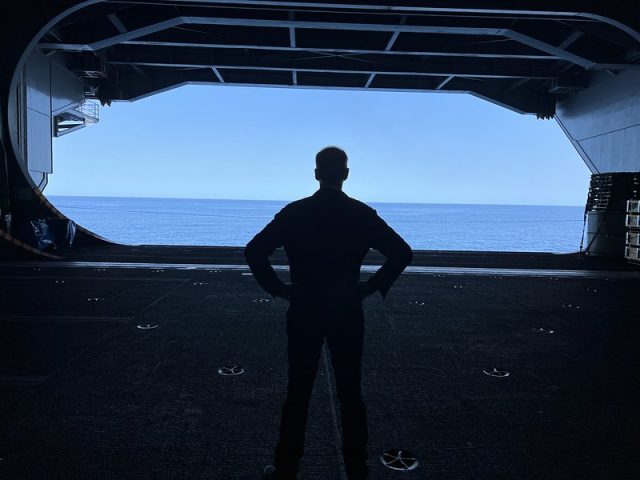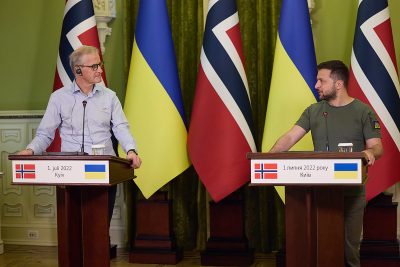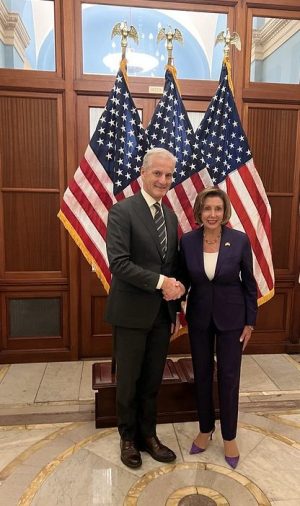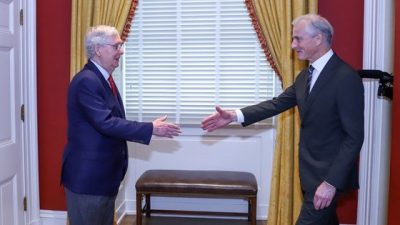NEWS ANALYSIS: As the leader of Norway’s neighbouring Russia shocked the world again, now with nuclear threats, Norwegian Prime Minister Jonas Gahr Støre readily concedes that his government must rely on the US and other NATO allies for any needed defense. They’ve all been gathered at the UN General Assembly in New York this week, but just before that, Prime Minister Jonas Gahr Støre was flown out to visit a US aircraft carrier at sea.

The carrier visit confirmed once again that the US and Norway are close allies and also that US forces will continue to maintain a strong presence in Norwegian territory, not least along its coast. “What gives Norway security is that we have allies who have capacity,” Støre told newspaper Aftenposten while standing on the deck of the USS Gerald R Ford on Monday.
Concerns remain over Norway’s lack of capacity to defend itself, even after being invaded and enduring Nazi German occupation during World War II, sharing a border with the Soviet Union throughout the Cold War and, more recently, with Russia under an increasingly aggressive Vladimir Putin. The Russian president’s announcement that he’s mobilizing 300,000 more Russian troops to send to Ukraine sparked more outrage and condemnation, as did his claims that Russia’s nuclear weapons were “even more modern” than NATO’s. US President Joe Biden called Putin “shameless,” while NATO’s Norwegian secretary general Jens Stoltenberg referred to Putin’s “rhetoric” as both ruthless and dangerous.
Ukrainians, meanwhile, managed to defend their capital of Kyiv when Putin launched his assault in February, have fought hard to defend the entire country and most recently reclaimed territory in the east that Russia had been occupying. Many defense experts now claim Putin has suffered humiliating losses and is merely responding in a desperate manner. Others stress how Ukraine had both a civilian population and a military that were well-prepared for an invasion even before they started receiving military aid from NATO countries including Norway and many others.

“An entire society stood together with a force that shocked the attackers,” Aftenposten wrote last week. Ukrainians kept food supplies, transport, telecommunications, banking services and social media going, along with delivery of electricity, water and heating. Russia was thus met by a “total defense,” and questions have risen over whether Norway could mount the same. Several researchers think not, even when crises loom.
Ukraine hadn’t been prepared when Putin first invaded Crimea in 2014 and then threatened Donbas farther north. Ukrainian defense had been neglected during its earlier regimes that were friendly with Russia and willing to bow to Putin. Tor Bukkvoll of Norway’s defense research institute FFI told Aftenposten that civilian Ukrainians’ long-standing lack of trust in government officials made them more self-sufficient: “They haven’t had any faith that the authorities will do anything to help the country move forward. They act themselves.”
Norwegians, by contrast, have relatively strong confidence in their leaders but researchers think they need to extend their dugnad culture of sharing social responsibility to better prepare themselves for any military crisis. “The war is not far away,” FFI’s research director Janet Blatny told Aftenposten. “We shouldn’t just rely on defense capacity. We need a total defense, too.”
Professional defense needs improvement as well, according to the head of Norway’s officers’ union. Torbjørn Bongo told newspaper Dagsavisen last week that the military is struggling to hang on to educated and trained officers. Many are also retiring upon turning 60, and he fears a shortage of officers in the years to come.
Norwegian Defense Minister Bjørn Arild Gram claimed in May that the government is strengthening civil defense at home. There’s been more emphasis on the need for national preparedness, from Norwegians getting lists of what to stock up on at home to implementation of anti-terror measures. More military exercises are being carried out within Norway and in NATO countries bordering on Russia, but FFI urges more resources for the health sector, fire and police departments and construction capacity to rebuild if necessary. The government is, meanwhile, funding a new defense commission charged with evaluating security- and defense policy and what should be prioritized to ensure both over the next 10- to 20 years.

FFI views a war with Russia as highly improbable, but thinks Norway must expect more Russian aggression. Defense capacity, FFI researchers suggest, should thus be subjected to “stress tests,” as should the supply chains for energy, food, water, electronic communication, transport, banking and social services. Defense Chief Eirik Kristoffersen agrees: “The best thing each one of us can do is to be able to take care of ourselves and those closest to us. Everyone needs to think through what they can do in a difficult situation.”
Kristoffersen also told Norwegian Broadcasting (NRK) that there’s less Russian military activity along Norway’s border. “We’re seeing considerably less presence of ground troops on Kola (the peninsula where Russia’s main northern base at Murmansk is located) than we’ve ever marked, as least as long as I’ve been in the service (34 years).” Many of the troops based in the far north have been moved to Ukraine, and many Russian soldiers reportedly have been killed. Defense capacity at naval- and air bases on Kola appears stable, but “they don’t have any offensive capacity left,” according to Kristoffersen.
Prime Minister Støre, meanwhile, was flown out to the US aircraft carrier from the huge US naval base in Norfolk, Virginia, just months after one of Norway’s frigates took part in support exercises for another US aircraft carrier, the USS Harry S Truman. Støre seemed proud that US Navy officials came with “genuine” praise of the Norwegian frigate’s contribution while actually under US command.

When asked why he’d taken the time to visit the USS Gerald R Ford at the start of a hectic week in Washington DC and at the UN in New York, Støre told Aftenposten it was to see “the core of Norway’s security.” In return, Norway can offer its geographic position in the Arctic and be “NATO’s eyes and ears” regarding nearby Russian military activity. “It’s fine teamwork with our allies,” he added. “What gives Norway a sense of security is that we have allies who have the capacity.”
No one can expect a country of less than 6 million residents to have the funding capacity of nations like the US. Aftenposten noted that the USS Gerald R Ford alone cost the equivalent of everything Norway spends on defense over a two-year period. Asked whether he expects US aircraft carriers to sail more often in Norwegian waters, Støre replied “yes,” adding how the base at Norfolk and its fleet is responsible for the Atlantic region.
Norway, to its credit, has invested in eight new surveillance aircraft (built in the US) and their crews are trained in Florida. Støre told Aftenposten that much of the US’ own military planning is based on information that Norway has contributed. Defense Minister Gram added that while Norway “is a small country, it contributes strongly to the NATO alliance through intelligence gathering, new fighter jets, the new surveillance aircraft and special forces. Gram also said that the US had been wanting to devote more of its military attention to Asia, “but I think the last nine months have reminded us all about the importance of the trans-Atlantic relationship.”

After Støre’s flight out to the aircraft carrier, he continued on to Washington DC, where he met with both the Republicans’ leader in the senate, Mitch McConnell, and with the Speaker of the House Nancy Pelosi. Most of their talks, according to the prime minister’s office, centered on the war in Ukraine.
“We also talked about how Europe will get through the winter with an energy crisis the likes of which we haven’t seen before,” Støre told Norwegian Broadcasting (NRK). “We have faith Europe will manage because we all must cooperate.”
Støre stated that he also thanked Pelosi and McConnell “for their important support.” McConnell, meanwhile, told NRK he was glad Støre visited, that the US appreciated the lengthy “cooperation we have in NATO” and that he’s glad Sweden and Finland are joining NATO, “so we’re all on the same side. But in my opinion, the most important thing in the world now is to beat the Russians in Ukraine.”
Then it was on to New York for the UN General Assembly, at which came news of Putin’s televised speech in Russia and his escalation of the war on Ukraine. Støre called it “extremely serious,” adding that it “will lead to more suffering for both Ukrainians and Russians. I repeat our strong urging to Russia to end this war. Ukraine has Norway’s full support.”
Norwegian Foreign Minister Anniken Huitfeldt said Norway would do what it could so that Putin will not succeed with his war either on Ukraine or on European energy supplies. “Putin has a goal of creating political division and an economic downturn in Europe,” Huitfeldt told Norwegian Broadcasting (NRK). “He will not succeed with that.”
More demonstrations against Russia, Putin and his war on Ukraine were set to take place in both Oslo and Norway’s northern city of Kirkenes, located closest to the Russian border, as the news from Moscow worsened.
“We don’t know when a crisis is coming, but we know that it will come,” FFI’s Blatny told Aftenposten, pointing to lessons from the pandemic. “We need to plan for that.”
NewsinEnglish.no/Nina Berglund

